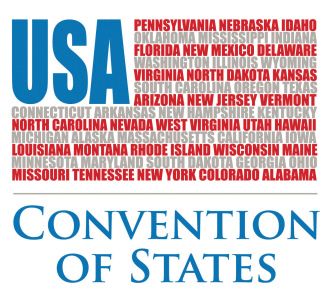Let’s be clear about the challenges facing Americans.
— Our nation’s fiscal operating debt currently stands at $22 trillion, with upwards of $215 trillion in unfunded liabilities. Everyone knows this is absolutely crazy and unsustainable. It will collapse at some point, and the only question is “When?”
— Our federal government employs 2 million employees, far more than needed. Please explain to me exactly what these millions of people do?
— States have lost their co-equal role in governing the nation. Bureaucrats act as de facto lawmakers, writing onerous rules and regulations. Activist judges make rulings based on their political beliefs rather than the original intent of the Constitution.
Every day government officials go to work, “We The People” lose a little more freedom.
Now let’s examine perhaps the wisest solution available to us. Wouldn’t you know — it comes straight from the U.S. Constitution.
The Founding Fathers put Article V in the Constitution because they knew the federal government would never relinquish power willingly. They gave states ultimate power over the federal government. Article V says that Congress, ”on the Application of the Legislatures of two thirds of the several States, shall call a Convention for proposing Amendments …” Thus, if 34 states demand it, Congress must call a convention for proposing amendments to the Constitution.
Based on this power delegated to the states by our Founders, I and many others are proposing that we save our republic by convening a Convention of States to consider amendments restoring meaningful limits to federal power and authority. The growing movement to call for an Article V Convention of States was started in 2013 by Mark Meckler and Michael Farris. It is endorsed by author and constitutional law expert Mark Levin, U.S. Senator Tom Cotton, commentator Ben Shapiro, former congressman Ron Paul, conservative activist Charlie Kirk, Florida governor Ron DeSantis and former Housing and Urban Development secretary (and acclaimed neurosurgeon) Ben Carson, to name a few.
How exactly does it work? Once 34 states call a convention, all 50 states send a delegate to represent their interests. Each state gets one vote on any constitutional amendment proposed. Amendments only pass to the states for ratification if a majority of the states vote in the affirmative. Congress has no say whatsoever over the outcome. It is completely in the hands of the states, which means it’s a whole lot closer to the hands of the people.
America has never amended the Constitution this way. That doesn’t mean we can’t. One objection to using this constitutional tool, some say, is that it might open the door to rewriting the entire Constitution. Antonin Scalia, the late Supreme Court Justice, acknowledged this risk but regarded it as a minimal and reasonable one. Why? Because to be ratified, a proposed amendment would need the approval of three-fourths — that is, 38 — states, as set forth in Article V. That’s a very high bar. Thirty-eight states probably would never agree to something radical such as, for example, abolishing free speech. In Scalia’s words, “[The Founders] knew the Congress would be unwilling to give attention to many issues … involving restrictions on the federal government’s own power … [so] they provided the convention [of states] as a remedy.”
A remedy of this kind is exactly what we need. Today, politicians can turn our lives upside down on a whim (thinks me: vaccine passports). This is the kind of stuff King George III did in 1775. Being at the mercy of distant, disconnected rulers was why the American Revolution was fought in the first place. But today we don’t need a revolution; we have Article V.
The convention should limit itself to:
1) greatly limiting the size, scope and jurisdiction of the federal government,
2) imposing fiscal restraints on the federal government, and
3) creating term limits for elected public servants.
Other good ideas include a limit on taxes, spending and borrowing. And how about a constitutional amendment stating that Congress can’t exempt itself from laws it passes? Congress does this thousands of times in arenas from insider trading (yes, you heard me right) to Obamacare. How about We the People say simply, through a brief amendment, “What’s good for the goose is good for the gander”?
A Convention of States will not solve all of America’s problems, but the Founders put it in the Constitution for a reason. They knew a time would come when Washington would become so big and intrusive that only We The People could cut it down to size. That time is now.

